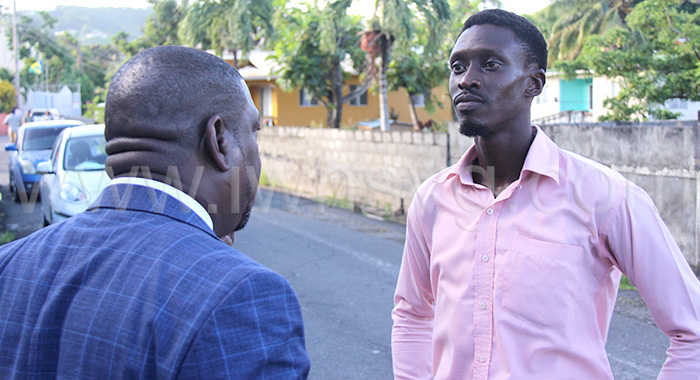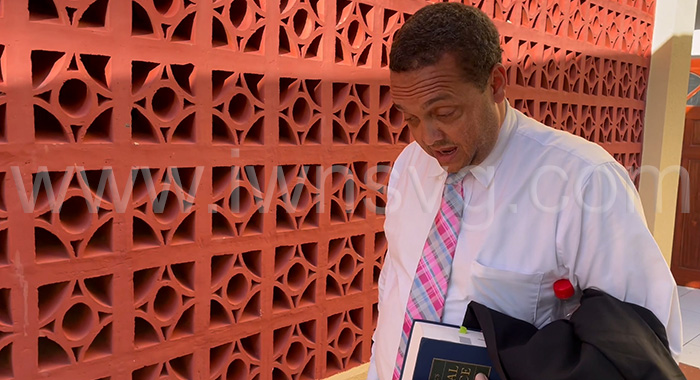A lawyer packed up his belongings and left the magistrate’s court in Georgetown around 4:56 p.m. Thursday, six hours into a trial inside the scorching courtroom, which adjoins the Georgetown Police Station.
Magistrate Kaywana Jacobs was hearing evidence on day two of the trial of Ashano Benjamin, 27, — son of Assistant Commissioner of Police Christopher Benjamin — and Kemani Gould, 28, of Barrouallie, on gun and ammunition charges.
The sitting of the Biabou Magistrate’s Court took place inside the courtroom that is part of the Georgetown Police Station — on the eve of the 13th anniversary of its official opening on Sept. 6, 2011.
The custom-built courtroom has no air-conditioning although the roof is about eight feet from the floor.
Further, the sash windows are broken and do not stay open, leaving the doors as the only source of ventilation on a day when the mercury soared to 31.9 degrees Celsius, according to SVG Met Services.
During Thursday’s sitting, the magistrate gave the defence lawyers and prosecutors permission to remove their jackets.
However, the lawyers continued to sweat and used their documents to fan themselves, even as an electric fan provided some relief to the magistrate inside the courtroom where mosquitos continually assaulted the occupants.
The trial began at the Calliaqua courtroom on Wednesday, where the insufferable heat also assailed the people in the purpose-built courtroom inside the Calliaqua Town Hall building.
The air-conditioning has not been working for at least two years inside the courtroom in the building that was officially opened just under seven years ago – on Oct. 3, 2017.

In Calliaqua, the court also had to contend with noise coming through the open windows of the building that is bound by the street on all sides in the south coast town, where an extensive road rehabilitation project is underway.
Around 3:50 p.m. on Thursday at the Georgetown courtroom, Grant Connell, who represents Benjamin, rose and told the court, “I can’t get any air.”
He said he had gone to use the bathroom, but had refused to do so on seeing the conditions there.
“I went to use the washroom; I refuse to use those toilets out there. That’s an act of savagery. I can’t do this,” Connell said.
The toilet door is closed by tying a piece of rope to the faucet on the face basin or the user holding the rope while sitting on the toilet bowl.
Further, to flush the toilet, one has to remove the tank cover and push the flushing mechanism, which is otherwise broken.
Magistrate used to conditions at court
“You have a fan to chase mosquitoes,” Connell told the magistrate.
However, Jacobs responded that her biggest personal difficulty was that she had not had anything to eat since she began sitting in the courtroom around 9:20 a.m.
“Your biggest difficulty? So, you accept this level of savagery?” Connell said.
“I don’t accept it but I have gotten used to it,” said Jacob, who was sworn in as a temporary magistrate on April 2.
Israel Bruce, who is representing Gould, burst out in laughter after the magistrate made her comment.
Connell told Jacobs that she could not settle for that.
“We have taken off our jackets and are still sweating. All the windows on the eastern side have burglar bars, the windows can’t open. The northern door, the wind can’t come through,” the lawyer said.
But Jacobs said she had noted the issues, adding that she did not know if it was possible to hear one more witness.
“I am saying this because I am aware that other counsel is about to leave the state and I am aware that the High Court resumes and I want to have the matter dealt with,” she said, referring to the prosecutor, Crown Counsel Rose-Ann Richardson.
Connell asked that the matter be transferred to the Serious Offences Court’s (SOC) courtroom in Kingstown, adding, “This or Calliaqua court is the same thing. No air conditioning.”
The magistrate said she did not know if SOC was sitting, but later confirmed that the court was on holiday and the courtroom was, therefore, available for use.
She, however, said that people with matters before the Biabou Magistrate’s Court had already been informed that their matters would be heard in Calliaqua.
“That’s the difficulty. If the courtroom was available and it was just this matter, I would gladly agree. But there are matters that are already listed for Calliaqua, so they are going to come there,” she said.
Connell, however, told the magistrate that if she said she would not hold hearings at the Georgetown or Calliaqua courtroom in those conditions, “better would be done”.
“If you settle for it, you would get bite up by mosquitoes and sweat like—” the lawyer said.
Jacobs responded that she had not succeeded in getting even lesser issues addressed.
‘I do want to leave from this ‘sauna’ — prosecutor
Meanwhile, Richardson told the court that she understood the situation, adding that she also had personal issues that she wanted to have addressed.
“So, I do want to leave from this ‘sauna’, as Mr. Chance has indicated,” she said, using a term that Kenton Chance, executive editor of iWitness News, had used to describe the courtroom.
The prosecutor, however, said there were civilian witnesses in the case who had attended the previous day and were also present on Thursday and were waiting to testify.
Richardson told the court that one of the witnesses was an entrepreneur whose business would close whenever he attended court.
The magistrate said she could at least try to take another witness.
“If that is agreed between both counsel, then that is fine,” Jacobs said.
Richardson said that she had been making a proposition to the defence counsel but they had made a counter proposition that she could not agree with.
The magistrate said that she would hear one more witness before ending the hearing for that day.
‘It is a choice you have to make’
However, the court went on to hear the evidence of three additional witnesses.
And when the fourth one was called, Bruce indicated that his cross examination of that witness would be lengthy.
On hearing this, Richardson told the court that she would like to have a word with the witness. The defence did not object and the prosecutor proceeded to speak with the witness briefly at the doorway to the courtroom.
However, at 4:56 p.m., after the witness had taken the oath and had gotten a few minutes into his testimony, Connell stood and said he could not take it anymore and had to leave the courtroom for his health.
The magistrate asked him what would happen in his absence.
“Your honour, you have to do what you have to do,” the lawyer responded.
The magistrate noted that the witness was already on the stand.
“It is a choice you have to make. I am not going to put my health over — with respect. I am going to have to leave your court. With the greatest respect. I am not even sure I can drive to go home. I sat here for the last half an hour contemplating. The court will have to do what it has to do. I apologise,” Connell said as he packed up his belongings and left.
After Connell left, Bruce noted that he had said that his health had to take precedence at that point.
Bruce said the witness was such that he (Bruce) “cannot and will not hold for counsel (Connell) as it relates to this witness.
“I don’t know how we proceed because, in essence, that response from learned Counsel Connell is tantamount to asking the court to adjourn the matter in the interest of his health,” Bruce said.

Bruce said that the most the court could do was to remind the witness that he was under oath and not allowed to discuss the case with any of the witnesses who had testified.
“… just as we do with jurors in the High Court and other witnesses who have to come back,” Bruce said.
“I know he is travelling with others back down to Barrouallie or to Layou. Just let him know that he is not to discuss any evidence at all with these people who’ve already given evidence… Because if you do that, you would be breaking the law and you yourself could end up in prison…” Bruce said, apparently addressing the magistrate and the witness.
He said that once the court issues this caution to the witness, he has no difficulty with the witness testifying at the Calliaqua courtroom early Friday morning (today).
“He is going to be in the box with me for a while,” Bruce said, referring to his intended cross-examination of the witness.
Bruce said that to put the case on the safest side, it would be best to adjourn the trial to Friday.
The magistrate said she was only pushing through because the prosecutor had asked her to.
Jacobs said that she also was not comfortable but she was “pushing through to assist”.
Bruce said: “I have seen counsel’s complexion. His complexion changed to peach so I know he is not well.”
The prosecutor, who was wearing a black suit, continued to fan herself with some sheets of paper through the exchange that late into the afternoon.
The magistrate told the witness that while it had been a long day, given the circumstances, she had to adjourn the matter to Friday at Calliaqua. She reminded him that he was under oath and instructed him not to discuss the case with anyone.







When will you all move forward? Just asking!
These are the conditions that not only the legal fraternity has to deal with but also the other persons attending court. It is quite unconscionable that persons have to work in this sort of environment. Is this a legacy of the good governance with is always being spun by the sitting party? Yet we spend monies pursuing cases such as the “vaccine” mandate and how much millions are being spent on a temporary parliament building, yet GHS is still in a swamp in Arnos Vale, how many years later, along with TSSS. Elections are coming soon, that is all I am saying, ELECTIONS ARE COMING SOON!
First off, the courtroom side exchange between the magistrate Jacobs and the counsel Connell ought to be instructive. Hers is a spirit of resignation, contentment of sorts and christian fortitude in the circumstances. Make of that what you will.
Outward appearances are beautifully intact though. Does the building get regular coats of paint? It likely does. The brick and mortar certainly is impressive; it speaks to progress and makes for great immortal, panoramic, digital photographs of ribbon-cuttings, fatted officials well-fed, well-watered, stuffed into expensive suits and beaming with pride whenever we audit the progress of the state.
But should we be asking for more or for something different?
Even now in challenging conditions such as those that triggered this report, the players are sartorially correct and on point. The contrast is stark. But does it all speak to states of mind and priorities? It had better not.
If you cannot get it any other way, just picture the elegant, straight-backed, high-value First Ladies of the state having a tussle with that piece of strongman rope when all they could think of is to relieve themselves and preserve their dignity?
Could it be that we are too busy making progress of the kind that ends up in a long list on the Vincy Issues page on Facebook to place priority on maintenance and upkeep? Could it be that the way we collectively use and abuse is an expression of frustration?
Is it time to include Public Sanitation or some variant thereof in the education curriculum at the primary level? After all, in an education revolution, the curriculum would be thoughtful, even revolutionary and fit for practical purpose. Should we not be living our education and putting it on full display every day?
But the truth is that maintenance in normal contexts is a focused activity, a habit, an attitude of respect for sunk costs, a little hint about our values and more besides. There might be useful symbolism in our choices and approaches.
And yes, the toilet facilities provided for the basic and essential comfort of all those upon whose muscled shoulders the noble civilization rests is a form of savagery. Management and maintenance are relatively small things for a country that literally moves mountains. Just do it.
Sad indictment on the powers that be. Crime will remain high when cannot be executed expeditiously. What ah shame.
remember that dem do not maintain nothing. , roads, buildings , .nothing at all. Maintainance is not a word in their vocab.
the court should be closed, and a more comfortable location found until proper AC equipment can be installed
All them million US$ the ULP is talking about and they can’t even maintain the court houses. People bawling and can’t get help with anything.